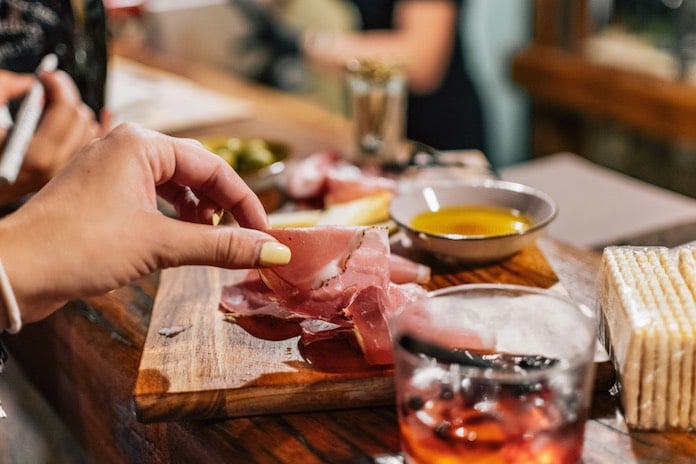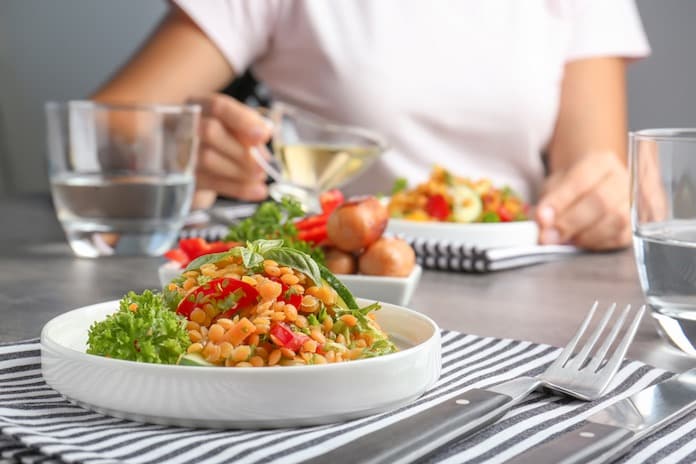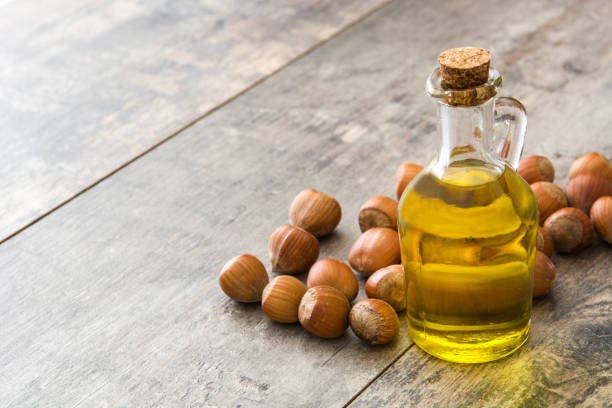A gluten-free diet, is a type of diet that eliminates gluten + the foods and products of which it is a part from the diet. Gluten is a protein found in wheat, spelt, barley, rye, oats and products and foods made from them.
The reason for the introduction of a gluten-free diet should be primarily a health effect/reason (celiac disease), however, gluten-free diets are very trendy nowadays for non-celiacs as well.
Is a gluten-free diet suitable for a more widespread recommendation?
First, the indication and characteristics of a gluten-free diet.
Celiac Disease
Gluten sensitivity, demonstrated by blood tests, is known as celiac disease. Celiac disease is a disease in which the body develops antibodies that attack the cells of the small intestine. The disease is characterized by an inflammatory process occurring in the mucosa of the small intestine.
Gluten intolerance may manifest symptoms such as:
- Abdominal pain,
- bloating,
- diarrhea,
- weight loss,
- general physical malaise and non-specific rashes, but asymptomatic forms of intolerance and allergy are by no means exempt.
This means that even a person so affected may hardly notice anything about himself and yet still suffer from various forms of gluten intolerance.
In celiac disease, gluten intolerance is usually permanent and lifelong
The only and effective treatment for celiac disease is a gluten-free diet.
Other restrictions related to the consumption of gluten
Then there is the group of people who do not have proven celiac disease, but whose health (digestion, bowel movements, bloating, gas, but also skin problems – acne, eczema, rashes, etc.) will improve significantly by eliminating gluten.
Gluten-free diet: principles and suitable foods
The basis of a gluten-free diet is the elimination of gluten from the diet. Gluten is a component of wheat including semolina, kamut and spelt (gliadin). It is also a component of rye (secalin), barley (hordein) and oats (avenin).
Important, to exclude from the diet those foods that are made from these types of cereals – Flour, pasta, flakes, groats, semolina, breadcrumbs, breadcrumbs, beer, grain brandy, biscuits, wafers, buns, cakes, dumplings, spelt coffee, rob meat, cobs, soups and sauces thickened with flour, oatmeal, semolina porridge, classic muesli.
The pitfalls of hidden gluten
It is necessary to be careful about possible hidden gluten in, for example, ketchups, puddings, dressings, spice mixes, ice creams, sausages…

Gluten-free foods
Among the gluten-free foods, rice, millet and buckwheat, buckwheat, amaranth, chile hake (= quinoa), tapioca, corn, corn polenta, potatoes, sweet potatoes, legumes, soybeans, tofu, tempeh, nuts and seeds, cocoa powder, fruits, vegetables are used, Meat, gluten-free ham, gluten-free baked goods, fish, eggs, snapper, fats, milk and dairy products, cheese, honey, tomato puree, and for thickening sauces and meat juices, for example, peas or potato starch, Jizerka flour and others.
Gluten-free diet also as a modern phenomenon for weight loss for all?
In addition to the people who must follow a gluten-free diet for the necessary health benefits, there are also people and advocates of a gluten-free diet who try this diet as a means to lose weight or just as a modern trend. Because this is where the world of social media is powerful – an influencer does it, I’ll do it too…
I can see in the strict exclusion of gluten from the diet for people who don’t have a medical intolerance to gluten three major ills:
- I’d be careful about strictly eliminating gluten, for the reason that our bodies don’t get used to metabolizing gluten after weeks or months. In case you then return to foods containing gluten, you would not find that gluten is suddenly not digested well by the body.
- If a gluten-free diet is inappropriately conceived, then it can do more harm than good: namely, when a gluten-free advocate builds a gluten-free diet on inappropriate products. Some gluten-free products are highly processed foods: various gluten-free biscuits, crackers, extruded bakery products, packaged bakery products, gluten-free spreads, sausages, etc. These gluten-free foods may contain high quality fats (solidified fats, palm fat), low quality sugars (glucose-fructose syrup) or many binders and thickeners (as gluten makes foods cohesive, so when gluten is removed from the food, another binder must be found to make gluten-free foods cohesive).
- Many gluten-free foods are then made from corn, rice or soy (crackers, pasta, cookies, biscuits,…). The downside here may be that it is white rice and corn (and products made from them) that may have a higher or outright high glycemic index, but this is an unfortunate effect in terms of weight reduction or in terms of maintaining normal glycemic levels.
So the term “gluten-free diet” certainly does not strictly mean “a diet suitable for weight loss”.
Gluten-free diet and weight loss
Yes, a properly designed gluten-free diet can help with weight loss, but it needs to be built on a different foundation than industrially processed and corn-, rice-, or wheat-based gluten-free foods.
A form of gluten-free diet that could be of benefit across the board
From the above, I’m not advocating that a strict gluten-free diet is suitable to recommend across the board, because there will always be a group of people who will take the wrong end of it. Plus, many gluten-free foods are more expensive, so even that aspect would be a barrier for some people.
On the other hand, I’m a big fan and advocate of reducing foods containing gluten and white wheat flour in our diets and replacing these foods largely with other equivalents:

This is because we eat gluten-containing foods, specifically wheat foods and industrially processed foods, in real abundance. Just think about how many baked goods, sweets, desserts, pasta, dumplings, pizza, beer, flour-laden sauces, soups, and other foods you eat per week?
How can you significantly eliminate gluten from your diet and benefit your health?
I have some practical tips for you:
- Classic pasta can be interspersed with buckwheat or legume pasta,
- Pancakes can be prepared by adding a portion of buckwheat flour to spelt flour,
- Meat juices and sauces can be thickened with peas, for example, or not thickened at all and boiled down to a reduction,
- Rye and oats contain less gluten than wheat, so by choosing, for example, rye baked goods or products made from rye and oats in general, you will also partially eliminate gluten in your diet,
- Cereal flakes, porridge mixes and muesli can also be chosen from gluten-free cereals – barley, sorghum, buckwheat, quinoa, paddy rice…,
- Side dishes can also be made more gluten-free and use more potatoes, sweet potatoes, vegetables (various purees and porridges), as well as natural rice, quinoa, buckwheat, sorghum, legumes,
- learn to bake with gluten-free flours (just keep in mind that gluten makes the dough cohesive and fluffy, so you need to choose a proven recipe so you are not disappointed with the result).
How about me?
Personally, I’m moving closer to a gluten-free diet with my diet because, despite not having celiac disease or any other form of gluten intolerance diagnosed, it obviously benefits my digestion: when I try to have gluten in my diet reduced, I don’t noticeably have a bloated belly.
It’s true that my diet is based mostly on basic foods (i.e., I eat industrially processed foods minimally), but on the other hand, I don’t eat strictly gluten-free precisely to preserve my body’s ability to metabolize gluten well.
Conclusion: is a gluten-free diet worth trying?
- If you are toying with the idea of trying a gluten-free diet, even if you don’t have a major health reason for it, then I would personally recommend keeping gluten in your diet at least to a small degree.
- I would also strongly urge quality in your gluten-free food choices and a focus on a diet full of quality nutrients and not just empty energy.
- As a final tip, I’ll add the ability to self-reflect – if you’re incorporating any changes into your diet, always observe the impact it has on your physique, health and psyche.
Read also:
- How do I check my gastrointestinal function?Stomach pain, constipation or diarrhea, bloating, belching, heartburn? These are all symptoms of problems in the gastrointestinal tract. It starts with the mouth and esophagus and ends with the intestines and rectum.
- What are the benefits of hazelnut oil for the skin?Hazelnut oil is rich in vitamins and essential fatty acids that nourish the skin. Here are a few reasons why you should add this oil to your skin care routine.
- Immune-boosting aromatic oilsThere are many products and treatments that can help your body to build a natural resistance to the harsh winter months, and aromatherapy is one of them. There are many studies supporting the healing power of aromatherapy and it is good for both mental and physical health. Aromatic essential oils also have many health benefits… Read more: Immune-boosting aromatic oils
- Marula Oil Benefits, Uses, and PrecautionsMarula Oil is an exotic oil that comes from the African Marula tree. It’s a good ingredient for skin, hair, and nails. Learn more about the benefits and precautions of Marula Oil with our guide.
- Goal setting for students, children and young peopleRemember when you learned how to set goals? If you have trouble answering this question, you are not alone! Most of us don’t spend much time thinking about how we set our goals. In fact, many of us don’t even think of goal setting as a skill; rather, it’s something we do without much thought.… Read more: Goal setting for students, children and young people
The articles on this site are for information purposes only. The site administrators are not responsible for attempting to apply any recipe, advice or diet, nor do they guarantee that the information provided will help or harm you personally. Be cautious and always consult a doctor or nutritionist!
*All products recommended are selected by our editorial team. Some of our articles include affiliate links. If you buy something through one of these links, you help us earn a small commission from the seller and thus support the writing of useful and quality articles.










